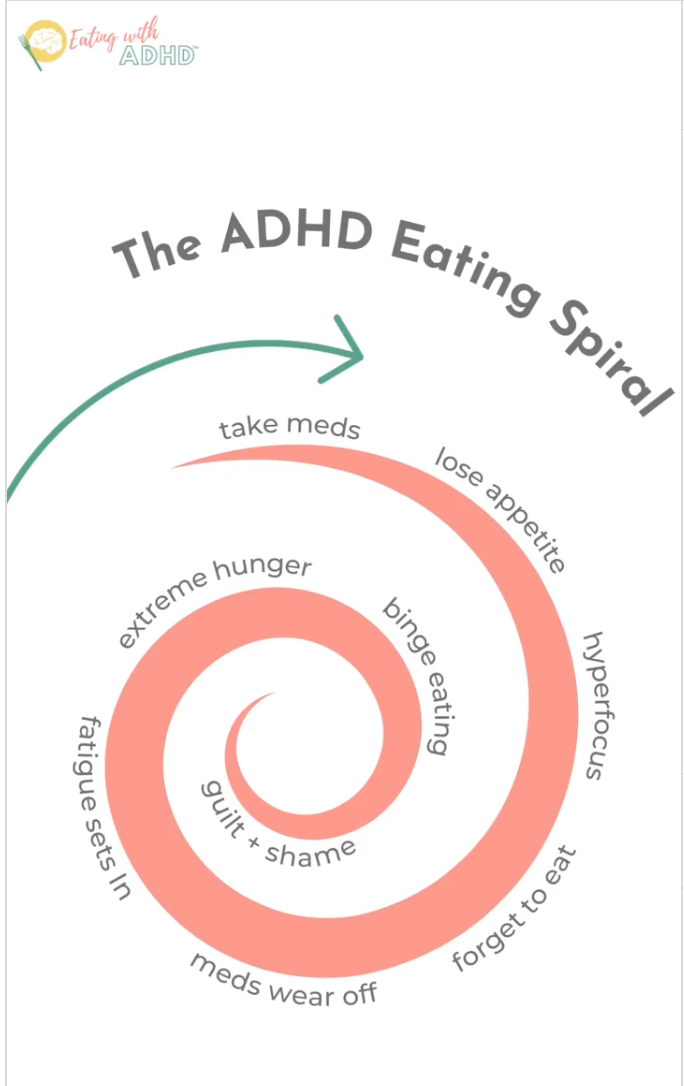Wise Heart Nutrition Blog:
All Things Anti-Diet, Intuitive Eating, and ADHD
Thoughts on Ozempic from the Wise Heart Nutrition Dietitians

Oh Ozempic. What a time to be alive and witnessing the new sci-fi-like rubbish from the worlds of diet and wellness culture. You have probably seen a story about *it* in the news, had conversations centered around *it* at your holiday tables, or maybe even have done your own curious digging and searching around the “extra extra!! new weight loss solution!!” BS that diet culture loves to spoon feed us on the regular.
The time has come to have a little chat about Ozempic.
OZEMPIC: What It's DOING, What It's DONE, & What We DON’T KNOW
If you are currently living under a rock or have somehow found a way around hearing about this new craze (but still somehow managed to find this blog post, lucky you!), We will give a brief overview of some current Ozempic deets and facts:
- Originally created and FDA approved for type 2 diabetics for blood sugar and insulin level management from one shot a week
- Imitates the hormone glucagon-like-peptide-1 (GLP-1) that is naturally produced in...
What's a Dopamine Menu and How Can It Help Me with Motivation?

How often have I found myself in this trance? Aimlessly wandering through the house with a restless lack of direction, motivation, and a daunting sense of uncertainty about how to break free from this stalled out inertia. Luckily, I’ve been hit with a BRAIN BOLT that once again reminds me of the trusty tool that has rescued me time and time again from this restless state.
Out of the desk drawer and into the light, I unearthed my once-forgotten but still perfectly serviceable "dopamine menu". Its novel, yet familiar presence was just the guidance I needed to pinpoint activities that could infuse my brain with some MUCH-needed dopamine, providing the energetic *spark* necessary to tackle the day of pending tasks.
In the whirlwind of our fast-paced world, where distractions abound and demand after demand looms, creating and sustaining focus and motivation is a very real challenge, especially for folx with ADHD.
Cut to our shining “dopamine menu” - a dynamic visual tool craft...
A Lifetime Relationship with Food and Eating: A Holiday Reflection

Rounding the corner, momentum strong, pumpkin spice thick in the air. You guessed it, the holiday season is nipping at our heels again!
Along with a good dose of joy, merry, and warmth, this time of year can also conjure up some bigger (and sometimes downright uncomfy) feelings, emotions, and reflections within our mind and body around sticky food rules, harsh and critical self-talk, and shame shame shame for every little move we make (or don’t make).
Personally, I’ve been feeling the pull to reflect on my food and body journey of holiday time past, my navigation of newer territory around the holidays this year, and some bigger picture food and body relationship realizations for future holidays (and future life in general)!
Oh yeah, who am I you may be asking? Let me introduce myself!

Hi there! I’m Marcy :) I’m a current Masters of Science in Nutrition student at Bastyr in San Diego, an ADHD human with a decade of (too much) familiarity with diet culture, a passionat...
What's the ADHD Eating Spiral and How Can I Get Out of It?

As a human who is eating with ADHD, you likely experience some *unique* patterns and habits around food and eating. Even when you do your very best to nourish yourself, you might often find yourself in a pretty sticky ADHD eating spiral.
Medicated for ADHD or not, it’s hard to snap out of hyper-focus, hard to hear and understand your special and subtle hunger cues, hard to face the steps on steps on steps it takes to get food from the kitchen to your mouth, and with an undernourished mind and body, your animal instincts can quickly become a barbaric sensation of NEED FOOD, ME HUNGRY… NOW! And thanks to diet culture, there is a steady stream of guilt, shame, and self-judgment that follows all of this.
That my friends, is what the Wise Heart team likes to call the ADHD Eating Spiral.
*click to check this post out on our the_adhd_rd Instagram!*
And for those of you that are of the unmedicated ADHD variety, this spiral has a similar loop but a different flavor to it. If you a...
3 Steps to Help You Let Go Of Food and Body Rules this Fall

Have you ever thought about the rules - some more obvious, others almost unnoticeable - that you hold around food and your body? Everyone has unique beliefs, narratives, and ideas that drive how we each relate to food and body, but where did they come from and why do we hold onto them? To really understand your own unique set of food and body rules, it can be helpful to take a little trip backwards in time, to visit your younger self.*
*If thinking about your own childhood feels triggering or activating, we suggest thinking about children in general for the example below
PICTURE THIS
Hi, little child, you. Sitting criss-cross-applesauce on the floor of the kitchen, overhearing the adults chatter on about what they don’t like or need to change about their bodies, commiserating over failed dieting attempts and sharing the latest fad diet tips… all of this swirling around as normalized kitchen counter chatter. The tune of the conversation getting slowly and steadily passed down thr...
Feeling Restless? Add Some New Tools to your Toolbox!

Transitions, changes, the unknown. Boredom, monotony, lack of stimulation. Both sides of the spectrum, both faces of the coin, can bring a sense of restlessness within us. It can feel unsettling in the body and for many of us, it’s hard to sit and be with that buzzy feeling of unease.
Our natural human instinct is to sound the brain sirens, react to that restlessness, impulsively grab the quickest and trustiest toolbox tool we’ve got, and hope the discomfort can be pacified, just for a moment, please!
So what does that trusty tool look like for most of us? Like a mother that gives a bottle to a crying baby, our lifetime body wisdom tells us food will comfort, console, and bring relief to us during those pesky periods.
And yes! Lived experience has shown us time and time again that the action of eating does soothe the ever-so-ancy soul. It is a tried and true tool in the emotional toolbox and because it’s also linked to the nourishment of this living and breathing body, i...
Moving Towards Being More KIND in our MIND: 3 Practices to Start!

I’m sure I’m not the only one that needs to hear this (and could really use the reminder #forever&always ♾) but boy oh boy can it feel like an uphill battle to be kind in our highly stimulated minds! The not-so-kind-in-our mind thoughts can feel like second nature, like a smooth and deeply grooved neural pattern to berate and beat ourselves up with. Whether it’s something we said last week, something we did yesterday, something we ate today, or something we’re actively thinking about (“WHY AM I THINKING THIS WAY?” 🧠inception🧠) it still leaves us feeling worse for wear in our mind and body and keeps the un-kind groove… groovin’.
Our quirky and unique brains can easily get on the un-kind merry-go-round, but have a hard time getting off once the cycles and circles are in motion. The thoughts are painfully stimulating! Emotionally charged! And it can feel like they’re firing on all cylinders up there.
So how can we *shhhhhh* quiet down the un-kind chatter in our brains? Keep read...
Doing a "Basic Needs Check-In" During a Hyper-Focus Flow: 3 Easy Tips

Picture this. Early morning sun streaming through the window, you have your (most likely a bit procrastinated?) project in front of you, you adjust your horse blinders, activate your tunnel vision, and become obliviously passionate at the task ahead of you: *write write write* *read read read* *click click click*. Let the hyper-focus flow commence...
🧠
🧠
🧠
Time passes, how long you’re not sure.
Your vision has blurred, your brain is pulsing, and you make the courageous decision to check what time it is. Here we are again, old friend. You did that fun ADHD thing *again* where you hyper focused past the point of rational rhyme and reasoning. Oops!
Nourishment and hydration were far away concepts during those hours and you’ve reached the state of ravenous reptilian brain. All earnest sense of “I planned on making this…” have *vanished* and your kind compassionate frontal cortex (and all the organs for that matter) are patiently waiting for their basic needs to be met before you’r...
5 Steps to Help You Get Started on Your Intuitive Eating Journey

So you’re here because intuitive eating sounds intriguing, but you just have no idea where to start. It’s ok - we’ve been there too! We’ve rounded up 5 actionable steps to start intuitive eating. Try 1-2 a week and call it your jump start month, or take allll the time you need. If you think about it, reading this article is already kinda the first step - so you’re killing it already!
Recognize that diet culture is harmful and weight loss is not equivalent to health
You may still be on the fence about this whole ~intuitive eating~ thing - that’s okay! The best way to get clear about what you want is to learn the facts. Unfortunately, folks are told over and over by medical professionals (including dietitians) that losing weight is necessary, when there actually isn't robust or causal research behind those recommendations. What we do know is that 95% of people who lose weight intentionally, end up gaining all or more back within 2-5 years. People end up fixating on weight and tr...
What are the Benefits of Intuitive Eating? Are there Drawbacks?

Intuitive eating has been a buzzword for quite some time now, and it's likely that you've come across various opinions and perspectives on the topic. With countless articles, blog posts, social media discussions, and even dubious spin-offs claiming the name of intuitive eating, it can be challenging to navigate the sea of information and determine the truth about its benefits and drawbacks. In this post, we'll break down the advantages and disadvantages of intuitive eating, highlighting that these factors vary depending on the individual. So, whether you're new to the concept or a seasoned pro, keep reading to learn more about this popular approach to eating.
Let's start with the good stuff and dive into the benefits of intuitive eating!
The Benefits
- A more balanced relationship with food
- Research has shown that practicing intuitive eating can lead to a more balanced relationship with food, decreased stress and anxiety around eating, and an overall more balanced plate a...

